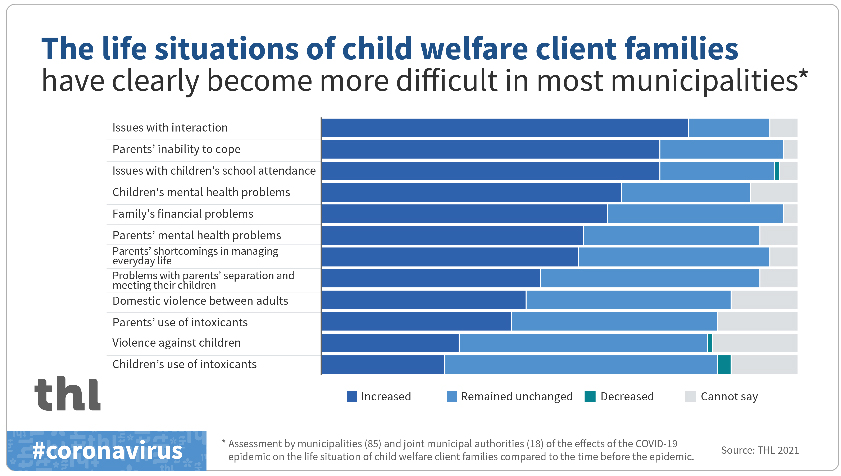The harmful impact of the coronavirus pandemic on people's mental health is one of the biggest unknowns for the future worldwide.
However, some of the consequences are already known. Also in Finland, despite the fact that in the Nordic country the restrictions have been much softer than in central and southern Europe in terms of lockdowns and cuts in freedoms.
Still, the difficulties faced by many Finnish families and the need for support have increased due to the spread of the Covid-19, according to a municipal survey commissioned by the National Institute for Health and Welfare (THL) and the Central Union for Child Welfare.
The study was directed at the management level of child welfare units and received responses from 85 municipalities and 18 joint municipal authorities.
The responses obtained by the researchers show that the life situations of the child welfare client families have clearly become more difficult in most places.
Up to 63% of municipalities estimated that children's mental health problems had increased compared to pre-epidemic times.
But the deterioration of mental health is not only suffered by Finnish children: similarly, 55% of municipalities estimated that parents experience more mental health problems than before.
“The increase in mental health problems is concerning. Post pandemic, we need to pay special attention to the availability of mental health services for children and adolescents", says Pia Eriksson, Senior Researcher at THL.
More than 70% of the authorities that responded to the survey estimated that child welfare client families were experiencing an increased amount of problems with interaction, parents’ inability to cope and children’s school attendance.

Poor access to psychiatry services
Of the municipalities that responded to the survey, 40% estimated that the number of child welfare clients had increased due to the epidemic, and 47% reported an increase in the number of child welfare notifications.
According to the survey, the availability of social and health care services for child welfare clients deteriorated during the winter also as a result of the Covid-19 epidemic, compared to autumn 2020.
“A particular challenge seems to be that child welfare clients have poor access to psychiatry services for children and adolescents and the services provided by the educational system and pupil welfare services. Schools need to invest in the wellbeing of children and adolescents by paying particular attention to the resources of pupil welfare services”, says Annukka Paasivirta from the Central Union for Child Welfare.
Of the municipalities and joint municipal authorities that responded to the survey, 56% estimated that access to pupil welfare services and the services provided by the education system had become at least somewhat more difficult. As for psychiatry services for children and adolescents, it was estimated that access had become more difficult in winter at least to some extent in 62% of municipalities and joint municipal authorities.
THL says there have been shortcomings in child welfare services for a long time, even before the Covid-19 epidemic.












